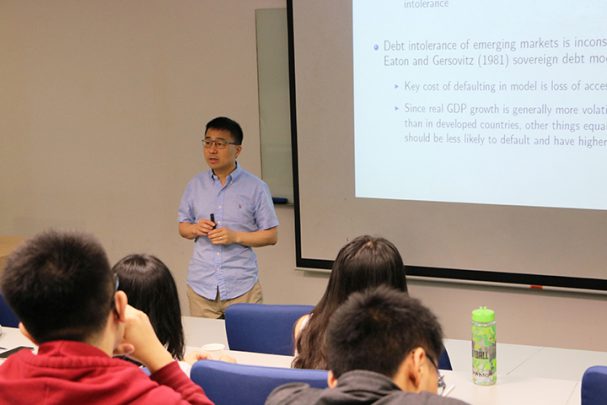| |
On 16 August 2018, Prof. Wang Neng, Chong Khoon Lin Professor of Real Estate and Professor of Finance at Columbia University, hosted a talk on "Rare Disasters, Financial Development, and Sovereign Debt." Targeting an audience consisting of financial professionals, academics, as well as students, the talk focused on the implication of the interaction between rare disasters and financial development for sovereign debt markets. The talk was based on Prof. Wang’s research in collaboration with Prof. Sérgio Rebelo of Northwestern University and Prof. Jinqiang Yang of Shanghai University of Finance and Economics. He began the talk by giving a little background into emerging economies and debt intolerance. He stated that emerging economies pay high spread on their sovereign debt, despite having much lower debt-to-GDP ratios than developed countries. Stating that the debt intolerance of emerging markets is inconsistent with classic Eaton and Gersovitz (1981) sovereign debt model, since real GDP growth is generally more volatile in emerging markets than in developed countries, assuming other things are equal, emerging markets should be less likely to default and have higher debt capacity. Their research proposes a model of sovereign debt where countries have different levels of financial development, the extent to which countries can hedge shocks to their economy in international capital markets. Delving further into his research, he stated that their model predicts that low levels of financial development generate key empirical features of sovereign debt in emerging economies: high credit spreads associated with lower debt-to-GDP ratios than those of developed countries. Their model is designed to measure financial development by the degree of financial spanning. It considers limited commitment with full or limited spanning and option to default. In conclusion, Prof. Wang stated that, financial development generates debt intolerance. Quantitatively speaking the rare disasters and low elasticity, with commonly used values for risk aversion and the discount rate, are sufficient to match the data. In theory, they proposed an integrated tractable sovereign debt model with default, that is, limited commitment and limited spanning, where credit spreads are high and volatile and the borrowing capacity is much reduced. He also mentioned some of the possible extensions to their research could be in risk premium, production, political economy, and debt maturity. A Research Associate at the National Bureau of Economic Research (NBER), Prof. Wang received his PhD in Finance from the Graduate School of Business at Stanford University in 2002. He has widely published in leading economics, finance, and business journals. He is an Associate Editor at the Journal of Finance and was an Editor in the Finance area at the Management Science. His research interests include corporate finance, contract theory, asset pricing, macroeconomics, sovereign debt and international finance, entrepreneurial finance, household finance, wealth distribution, asset allocation, risk management, private equity, hedge funds, investor protection, real estate finance, and the Chinese economy.
|
|


